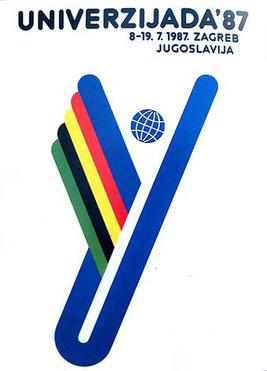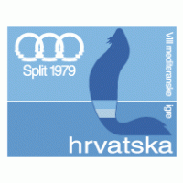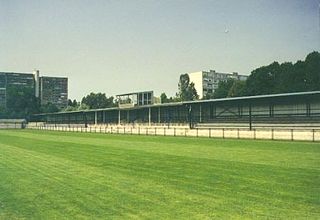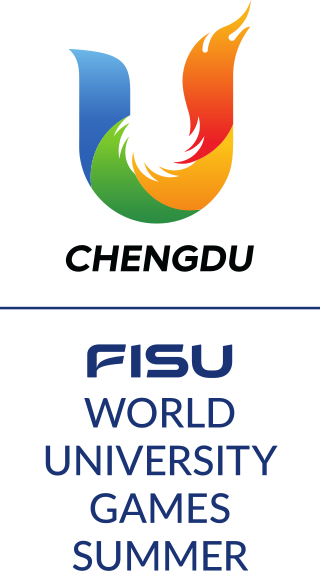The Associação Académica de Coimbra (AAC) is the students' union of the University of Coimbra (UC). Founded in Coimbra on November 3, 1887, it is the oldest students' union in Portugal. It is also the biggest Portuguese students' union belonging to an independent institution, since it represents all the students of its university, who gain automatic membership into the AAC as students of the University of Coimbra.

The FISU World University Games, formerly the Universiade, is an international multi-sport event, organized for university athletes by the International University Sports Federation (FISU). The former name is a portmanteau of the words "University" and "Olympiad".

The International University Sports Federation is responsible for the organization and governance of worldwide sports competitions for student-athletes between the ages of 17 and 25. It was founded in 1949 as the world governing body of national university sports organizations and currently has 165 member associations from five continents. Between 1949 and 2011, it was based in Brussels (Belgium); it was relocated to Lausanne (Switzerland) since 2011.

The 1987 Summer Universiade, also known as the XIV Summer Universiade, took place in Zagreb, SR Croatia, SFR Yugoslavia. It involved participants from 111 countries and over 6,000 individual sportspersons and members from delegations.

The 1979 Mediterranean Games, officially known as the VIII Mediterranean Games, and commonly known as Split 1979, were the 8th Mediterranean Games. The Games were held in Split, Yugoslavia, from 15 to 29 September 1979, where 2,408 athletes from 14 countries participated. There were a total of 192 medal events from 26 different sports.

The Croatian World Games are an Olympics-style amateur multi-sport competition pitting autochthonous Croat communities in Croatia and neighbouring nations against each other and Croatian diaspora communities, representing countries they live in. The event is organized by the Croatian Olympic Committee and the Croatian World Congress. It is also known under the unofficial name Crolympics, with the motto "Olympic games with Croatian sign".
Sport in Croatia has significant role in Croatian culture, and many local sports clubs as well as the Croatian national squads enjoy strong followings in the country. The most enduring sport by far in Croatia is football, and is played on amateur and professional levels amongst all age groups across the entire country. Several other major team sports are handball, basketball and water polo, with clubs in all parts of Croatia. Ice hockey is another popular team sport, namely in the Croatian interior. The most popular individual sports in Croatia are tennis, alpine skiing, and swimming, and to some extent table tennis and chess. Various amateur sport games are popular in Croatia, notably picigin.
Danira Bilić is a retired Croatian basketball player. As part of the Yugoslavian women's team, she won a silver medal at the 1988 Seoul Olympics. She was European basketball's Most Valuable Player three times running, in 1988, 1989 and 1990. In 1991, she was awarded Croatia's highest national recognition for sports, the Franjo Bučar State Award for Sport.

Stadion NŠC Stjepan Spajić is a football stadium in the Siget neighborhood of Zagreb, Croatia. It was built in 2000 and serves as home stadium for the NK Hrvatski Dragovoljac football club. The stadium has an all seater capacity of 5,000 spectators. It is named after the late club president Stjepan Spajić.

European University Sports Association (EUSA) is an umbrella non-governmental (NGO) non-profit organisation, working in the field of university sport in Europe.
European Universities Championships (EUC) are university sports competitions governed by the European University Sports Association (EUSA) since 2001. There are currently 23 sports in which the championships are organised. Participants in these events are European university teams and individuals.
The 2012 European Universities Games, were the first European Universities Games, hosted by Córdoba, Spain between July 13 and 23, 2012.

The 2017 Summer Universiade, officially known as the XXIX Summer Universiade and commonly called Taipei 2017, was a multi-sport event, sanctioned by the International University Sports Federation (FISU), held in the city of Taipei, Taiwan. It took place from August 19 to August 30, 2017.

The 2019 Summer Universiade, officially known as the XXX Summer Universiade and also known as Naples 2019, or Napoli 2019, was held in Naples, Italy, between 3 and 14 July 2019.
The European Universities Games (EUG) is an international multi-sport event, organized every two years for university athletes by the European University Sports Association (EUSA). The first edition was held in 2012 in Cordoba, Spain. On April 9, 2016 the EUSA General Assembly in Wrocław, Poland announced Belgrade, Serbia to host the 2020 Edition.

The 2021 Winter Universiade, officially known as the XXX Winter Universiade or 30th Winter Universiade, and commonly known as Lucerne 2021, is a cancelled multi-sport event for student and youth athletes that was scheduled to take place from 11 to 21 December 2021 in Lucerne, Switzerland, with preliminary competition in some events beginning 6 December 2021. The Games were to be hosted at venues in cantons of Central Switzerland, including Lucerne, Nidwalden, Obwalden, Schwyz, Uri, and Zug.

The 2021 Summer World University Games (2021年夏季世界大学生运动会), officially known as the XXXI Summer World University Games and also known as Chengdu 2021, was a multi-sport event sanctioned by the International University Sports Federation (FISU), held from 28 July to 8 August 2023 in Chengdu, Sichuan, China. It was the fourth time the Games was hosted in China. This is the first time the Games was referred to as the "Summer World University Games" rather than the "Summer Universiade."
The 2018 European University Games was the fourth biannual European Universities Games (EUG). It was held in Coimbra, Portugal from 15 July to 28 July and was organised by the European University Sports Association (EUSA) and Portuguese University Sport Federation (FADU) with the cooperation of University of Coimbra, Municipality of Coimbra, and the Academic Association of Coimbra (AAC).
The 2020 European University Games would have been the 5th biannual European Universities Games (EUG). It was scheduled to be held in Belgrade, Serbia from 12 July to 26 July. However, this event was postponed to 2021 due to the COVID-19 pandemic on 27 March 2020. The new dates proposed for the competition were from 14 July to 27 July 2021. On 5 May 2021 EUSA announced the games not being held. The event was planned involve 21 different sporting disciplines in the sports programme. It would have been organised by the European University Sports Association (EUSA) and University Sports Federation of Serbia with the special cooperation alongside University of Belgrade.

The Armenian Student Sports Federation (ARMSSF) is a national non-governmental organization responsible for advocating, supporting and promoting the interests of students' sports and physical activities in Armenia. The headquarters of the federation is located in Yerevan. The Federation maintains numerous cooperation agreements with universities across Armenia.












